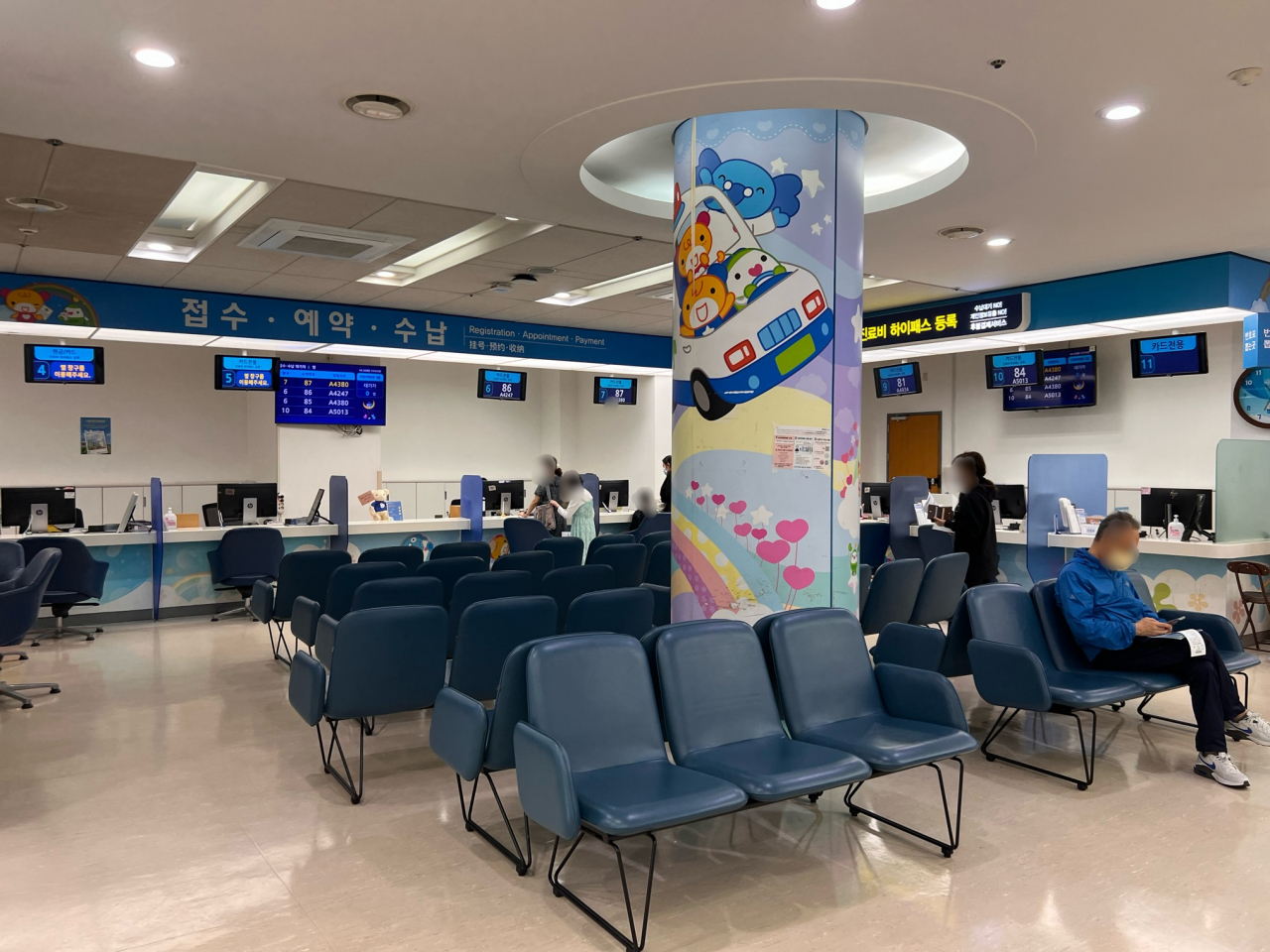Medical profs at top hospitals suspend surgeries, clinics
Medical standoff continues as largest doctor group picks 'hard-liner' as new head
By Park Jun-heePublished : April 30, 2024 - 15:42

Some medical professors at the country’s three major hospitals, Seoul National University Hospital, Severance Hospital and Korea University Hospital, suspended surgeries and outpatient clinics on Tuesday for one day, as previously announced, to protest the government’s plan to expand the number of new medical students by 2,000 a year.
The main hall at SNUH’s Cancer Hospital was without medical staff Tuesday, while a number of patients wandered around the ward, having just learned that the doctors wouldn’t be coming in. Some said they hadn’t been told that their appointments would be canceled or postponed; other said they had to wait in long queues, not knowing when their names would be called.
Jang Eun-ho, a 34-year-old patient battling a hematological malignancy, commonly known as blood cancer, was devastated after hearing that his appointment had been postponed to the afternoon as many professors left their posts to take a day off.
“I’ve been receiving treatment for five years (at SNUH), and I’m almost cured. ... (But) this is the first time I’ve experienced such disruption during my hospital visits,” he told The Korea Herald.
“I came here (today) for a consultation with my doctor, not for medication. But it would have been more irritating if I hadn’t heard that my treatment had been delayed. I feel bad for those waiting in line not knowing when they will meet their doctors, or if they even can,” Jang said.
SNUH closed at least 30 to 40 percent of its outpatient clinics Tuesday and did not perform 60 to 70 percent of its regular surgeries, according to Bang Jae-sung, who heads the SNUH’s emergency committee.
A senior official at the Health Ministry told The Korea Herald that not many hospitals experienced partial closures, though they declined to comment on the exact number of affected hospitals.
The SNUH faculty council’s emergency committee announced last week that medical professors would suspend treatments this Tuesday due to exhaustion brought on by the monthslong medical vacuum amid the walkout by junior doctors. Four committee executives who all belong to essential medical fields are set to resign on Wednesday.
The emergency committee of medical professors at the University of Ulsan College of Medicine, who also work as senior doctors at Asan Medical Center, said they will take Friday off. Professors at Seoul St. Mary’s Hospital, another major hospital, will suspend noncritical surgical services every Friday starting this week.
Medical professors are also mulling extending the suspension period if the government finalizes and announces an increase in the medical school admissions quota for next year, according to reports.
The medical standoff between the medical circle and government is likely to deepen, as the main opposition Democratic Party of Korea leader Lee Jae-myung agreed that the medical student quota needs to be raised, during his meeting with President Yoon Suk Yeol on Monday.
The Korean Medical Association, the largest doctors group in the country, meanwhile has elected new leadership, President-elect Lim Hyun-taek, known as a “hardliner,” who will officially start his term on May 1.
Lim has consistently demanded that the government cancel its proposed quota hike and abolish the medical reform committee as prerequisites for initiating talks with the medical sector. Lim’s position is that, rather than the government implementing its plan unilaterally, the government and medical circle should then restart negotiations from the beginning.
In addition, the KMA said Tuesday that it plans to create a pan-medical consultative body consisting of its members, medical professors, students and junior doctors to respond to the government’s actions.
“Now is the time for the government to change its attitude (about increasing the number of medical students. (We) strongly demand that no further damage be caused (to the health care system) and hope that the government realizes that the public wants (to see) the government’s sincere attitude and (its will to) talk (with doctors),” the KMA said in a statement.
Amid crippling anxiety from patients, the Health Ministry said no major disruptions were expected at hospitals as the professors have not fully suspended treatment, shrugging off concerns.
The ministry urged medical professors to return to their posts swiftly and stand by their patients to resolve disruptions adversely affecting people who require treatment.
Meanwhile, medical schools that have been allocated additional slots are expected to increase their seats by 1,500 to 1,600 for the 2025 school year following the government’s decision to grant flexibility in the quota allocation, according to reports on Tuesday citing educational and university authorities.
The Seoul Central District Court on the same day rejected an injunction filed by 485 medical students against the chiefs of three state-funded universities and the president of the Korean Council for University Education to halt the hike in medical school enrollment quotas.








![[KH Explains] Hyundai-backed Motional’s struggles deepen as Tesla eyes August robotaxi debut](http://res.heraldm.com/phpwas/restmb_idxmake.php?idx=644&simg=/content/image/2024/05/16/20240516050605_0.jpg&u=20240516155018)


![[Graphic News] UK tops global chart for child alcohol use](http://res.heraldm.com/phpwas/restmb_idxmake.php?idx=644&simg=/content/image/2024/05/15/20240515050228_0.gif&u=)







